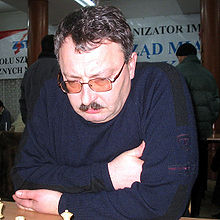
- Chess World Cup
- FIDE Grand Prix
- Olympiad
- World Championship
- List of strong tournaments
- List of world championships

- Checkmate patterns
- Chess openings
- Chess strategy
- Chess tactics
- Chess theory
- Endgames
- Pawn structure
- Problems/Compositions













Vladimir Malaniuk at Kraków 2006
|
|
| Full name | Vladimir Pavlovich Malaniuk |
|---|---|
| Country | Ukraine |
| Born | July 21, 1957 Arkhangelsk, Soviet Union |
| Title | Grandmaster |
| Peak rating | 2635 (July 1993) |
Vladimir Pavlovich Malaniuk (Malanyuk) (Ukraine: Володимир Павлович Маланюк; born July 21, 1957, Arkhangelsk, Soviet Union) is a Ukrainian chess Grandmaster.
Considered by many to be one of the more colourful characters on the chess circuit, he has an extraordinary talent for rapid chess, which has been demonstrated at some of the world's most prestigious 'speed chess' tournaments.
In 2005, he finished second at the Tallinn (Keres Memorial) rapid event, behind Alexey Shirov but ahead of such luminaries as Anatoly Karpov and Boris Gelfand. The same year, he took the silver medal at the European Rapid Championship, behind the strong Hungarian Grandmaster (GM) Zoltan Gyimesi. His sustained efforts were again rewarded in 2006, when at the Ajaccio Open Rapid event, he finished clear winner, ahead of a large group of strong GMs and Super-GMs including Kasimdzhanov, Milov, Bareev, Motylev, Bologan, Almasi, Smirin, Sokolov, Naiditsch, Sasikiran and Van Wely.
Whilst it is rare that older players can achieve this kind of success against more youthful talents, it is not completely unknown. Yuri Balashov is another mature player who enjoys success in such events and it is probable that good quality rapid chess relies as much on intuition as calculation and stamina, giving the experienced professional good chances against younger, sharper, but less knowledgeable minds.
Malaniuk has also been a strong player at standard time limits, winning many national and international tournaments, including Minsk 1985, Kostroma 1985 (USSR Ch. Semi-final), Lvov 1986 and Frunze 1987 on the road to securing his Grandmaster title (awarded in 1987). There were further victories recorded at Forlì in 1990 and 1992, Porto San Giorgio 1994, Minsk 1997 Krasnodar 2001, Arkhangelsk 2002, Krasnodar 2002, Koszalin 2002, Kolobrzeg 2003, Kraków 2003 and Mielno 2006. Notable runner-up performances include Baku 1983, Tallinn 1987, Lvov 1988, Świdnica 2001 and Kraków 2004.
He was a regular participant of the Soviet Championships between 1983 and 1991; his best finish occurring in 1986, when he shared second place behind Vitaly Tseshkovsky. In Ukraine, he has thus far been the national champion on three occasions, in 1980, 1981 and 1986. In team chess, he played for Ukraine in the Moscow 1994, Yerevan 1996 and Elista 1998 Chess Olympiads, winning team silver and bronze medals in '96 and '98, respectively.
Malaniuk has been credited with an important contribution to chess opening theory. Along with Sergey Dolmatov, Mikhail Gurevich and Evgeny Bareev, his faithful adherence to the Leningrad Dutch Defence (described as a hybrid of the Dutch and the King's Indian) helped shape a dynamic new approach to the system in the 1980s and this led to a dramatic resurgence of interest. That it affords black the opportunity to unbalance the position and fight for the full point is probably its main attraction. The system has since become a popular choice for players at all levels, following the publication of a number of books and theoretical guides.
In a more minor capacity, he and Vladimir Akopian are noted for their attempts at reviving the Spielmann Variation (4.Qb3) of the Nimzo-Indian Defence, but have not met with any real success.
In 2001, Russian player and chess journalist Evgeny Atarov reported that Malaniuk was severely ill and was undergoing a number of surgical operations, the funding of which had become a cause for concern.
Polugaevsky-Malaniuk, USSR Ch. 1983, Leningrad Dutch, 0-1 Black ventures forward on the kingside while carefully neutralising white's central threat.